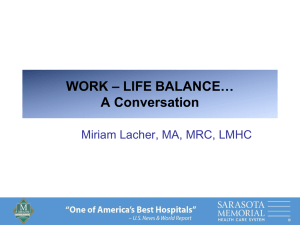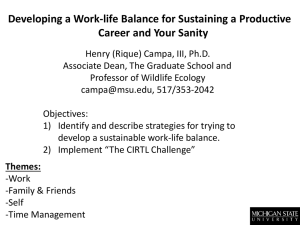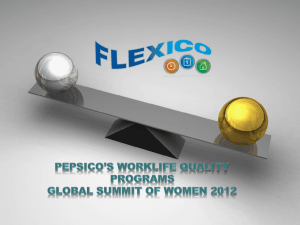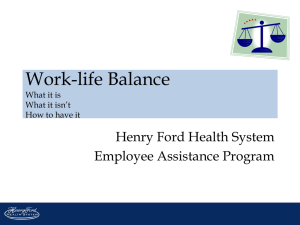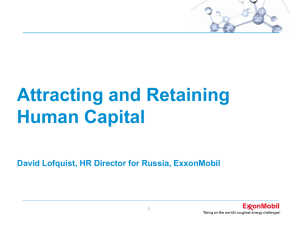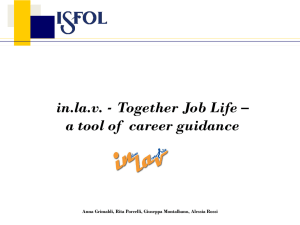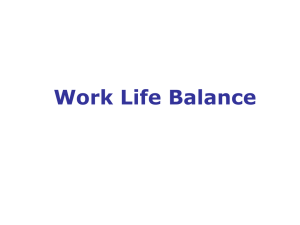Annexes - Ministry of Social and Family Development
advertisement
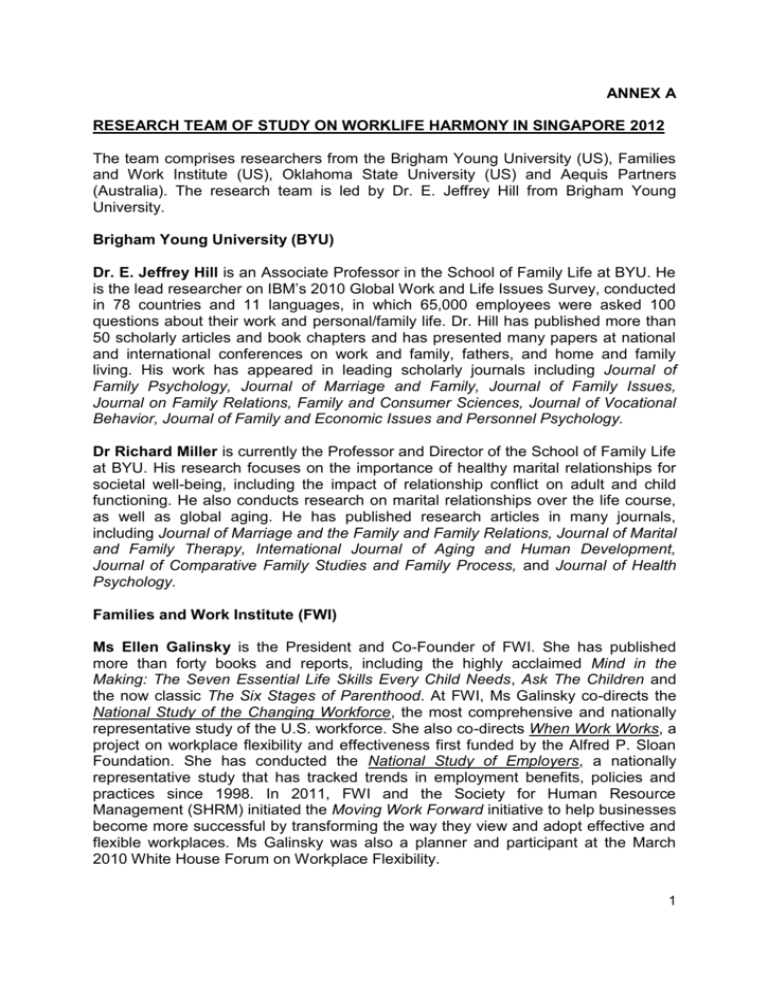
ANNEX A RESEARCH TEAM OF STUDY ON WORKLIFE HARMONY IN SINGAPORE 2012 The team comprises researchers from the Brigham Young University (US), Families and Work Institute (US), Oklahoma State University (US) and Aequis Partners (Australia). The research team is led by Dr. E. Jeffrey Hill from Brigham Young University. Brigham Young University (BYU) Dr. E. Jeffrey Hill is an Associate Professor in the School of Family Life at BYU. He is the lead researcher on IBM’s 2010 Global Work and Life Issues Survey, conducted in 78 countries and 11 languages, in which 65,000 employees were asked 100 questions about their work and personal/family life. Dr. Hill has published more than 50 scholarly articles and book chapters and has presented many papers at national and international conferences on work and family, fathers, and home and family living. His work has appeared in leading scholarly journals including Journal of Family Psychology, Journal of Marriage and Family, Journal of Family Issues, Journal on Family Relations, Family and Consumer Sciences, Journal of Vocational Behavior, Journal of Family and Economic Issues and Personnel Psychology. Dr Richard Miller is currently the Professor and Director of the School of Family Life at BYU. His research focuses on the importance of healthy marital relationships for societal well-being, including the impact of relationship conflict on adult and child functioning. He also conducts research on marital relationships over the life course, as well as global aging. He has published research articles in many journals, including Journal of Marriage and the Family and Family Relations, Journal of Marital and Family Therapy, International Journal of Aging and Human Development, Journal of Comparative Family Studies and Family Process, and Journal of Health Psychology. Families and Work Institute (FWI) Ms Ellen Galinsky is the President and Co-Founder of FWI. She has published more than forty books and reports, including the highly acclaimed Mind in the Making: The Seven Essential Life Skills Every Child Needs, Ask The Children and the now classic The Six Stages of Parenthood. At FWI, Ms Galinsky co-directs the National Study of the Changing Workforce, the most comprehensive and nationally representative study of the U.S. workforce. She also co-directs When Work Works, a project on workplace flexibility and effectiveness first funded by the Alfred P. Sloan Foundation. She has conducted the National Study of Employers, a nationally representative study that has tracked trends in employment benefits, policies and practices since 1998. In 2011, FWI and the Society for Human Resource Management (SHRM) initiated the Moving Work Forward initiative to help businesses become more successful by transforming the way they view and adopt effective and flexible workplaces. Ms Galinsky was also a planner and participant at the March 2010 White House Forum on Workplace Flexibility. 1 Oklahoma State University Dr Joseph G. Grzywacz is an interdisciplinary social scientist whose graduate and post graduate training focused on the human and social ecology of adult health. He publishes papers focused on the health-related implications of work and family, as well as the linkages between work and family. His research has been supported by public and private sponsors including the National Institutes of Health and the Alfred P. Sloan Foundation. The research has appeared in journals such as the Journal of Marriage and Family, Social Science and Medicine, Journal of Immigrant Health, Journal of Health and Social Behavior, Behavioral Medicine, Journal of Occupational Health Psychology, and American Journal of Health Promotion. His papers have been recognized as among the “best of the best” of work-family research in two of the past five years. Aequis Partners (Australia) Dr. Graeme Russell is an internationally recognised researcher, writer and consultant on work-life issues and organisation change. He has worked extensively in a range of organizations and in different countries (eg. Australia, New Zealand, Singapore, China, United States, Japan, Korea, United Kingdom, The Netherlands). He is a regular presenter at global conferences on flexibility and work-life. He has recently written a report on Work and Life in China for multinational enterprises. Until 2007, Dr Russell was an Associate Professor in Psychology at Macquarie University, where he taught Organisational Change, Learning and Development and Survey Design and Analysis. He has published widely in the academic literature on diversity, flexibility and work-life. Graeme Russell is currently a Board member of the Diversity Council of Australia. 2 ANNEX B WORK-LIFE HARMONY INDEX The Work-Life Harmony Index was computed based on the nine questions (see box below). The first question asks respondents to rate their perceptions of their ability to effectively integrate work and personal/family aspirations. The second question asks respondents to rate their perceptions of the degree of difficulty in integrating work and family/personal life. The next seven questions ask about “fit” between the respondents’ jobs and various aspects of personal/family life. These questions ask respondents to rate if their jobs fit well with their individual personalities, preferred pace of life, desires for social interaction, personal aspirations, desires to be happily married, desired number of children, and desires to spend time with their family. Components of the Work-Life Harmony Index 1. All in all, I am able to effectively integrate my work responsibilities and family/personal aspirations. 2. How easy or difficult is it for you to integrate your work and your personal/family life? My job fits well with: 3. 4. 5. 6. 7. 8. 9. My individual personality. My desire to be happily married. My desired number of children. My desire to spend time with my family/children. My preferred pace (tempo) of life. My desire for social interaction (e.g. being with friends). My personal aspirations. 3 ANNEX C CORRELATION OF WORK-LIFE HARMONY TO WORK, PERSONAL, AND FAMILY OUTCOMES Table 1 below notes the difference in work outcomes between respondents with high work-life harmony scores (greater than 70) and those with low work-life harmony scores (less than 55). In general, those who scored high on the Work-Life Harmony Index reported greater job loyalty, satisfaction, opportunity, engagement and performance, as well as lower job attrition. For instance, while 67% of those with high work-life harmony scores reported that they are extremely or very loyal to their employer, only 38% of those with low work-life harmony scores have this high level of loyalty. Table 1. Positive relationship between work-life harmony and valued work outcomes WORK OUTCOMES Job Loyalty (% Extremely/Very Loyal) Job Satisfaction (% Very/Somewhat Satisfied) Job Opportunity (% Excellent/Good) Job Engagement (% Strongly Agree/Agree) Job Attrition (%Likely/Very Likely to look for a new job) Job Performance (% Above Average) Respondents Respondents with low with high workwork-life life harmony harmony scores scores (greater than (less than 70) 55) 38 67 64 94 43 77 71 94 31 10 44 72 4 2 Table 2 notes the difference in family outcomes of those with low work-life harmony scores and those with high work-life harmony scores. In general, those scoring high on the Work-Life Harmony Index reported higher family satisfaction, and better relationships with their children, families, and friends. In addition, they also expect to have more children in the family. For example, while 69% of those with high work-life harmony scores reported a very high level of family satisfaction, only 43% of those with low work-life harmony scores reported such a high level of satisfaction. Table 2. Positive relationship between work-life harmony and valued family outcomes FAMILY OUTCOMES Family Satisfaction (% Extremely/Very Satisfied) Family Relationship (% Extremely/Very Satisfied) Friend Relationship (% Extremely/Very Satisfied) Child Relationship (% Extremely/Very Satisfied) Fertility (Projected # of children) Respondents Respondents with with high low work-life work-life harmony harmony scores scores (less than (greater than 55) 70) 43 69 42 58 41 57 46 72 1.93 2.05 5 3 Table 3 notes the difference in personal outcomes of those with low work-life harmony scores and those with high work-life harmony scores. In general, those scoring high on the Work-Life Harmony Index reported higher life satisfaction, greater peace in their lives, and better physical and mental health. For example, while 69% of those with high work-life harmony scores agreed that they are extremely/very satisfied with their lives, only 38% of those with low work-life harmony scores reported such a high level of satisfaction. Table 3. Positive relationship between work-life harmony and valued personal outcomes Respondents Respondents with with low work-life high workPERSONAL OUTCOMES harmony life harmony scores scores (less than (greater than 55) 70) Life Satisfaction (% Extremely/Very Satisfied) Peace (% Strongly Agree/Agree/ Somewhat Agree) Physical Health (% Excellent/Good) Mental Health (Index of 2 items) 38 69 80 98 82 94 64 78 6 ANNEX D Tripartite Committee on Work-Life Strategy (TriCom) Work Life Harmony Initiatives The Tripartite Committee on Work-Life Strategy (TriCom) oversees the promotion of Work-life Harmony in Singapore. The TriCom comprises the Government (Ministry of Social and Family Development, Ministry of Manpower, National Population and Talent Division and Public Service Division), unions, employers, business associations and HR practitioners. Building the business case for Work Life Harmony 2 To build the business case for work-life harmony, TriCom members have conducted several studies, which include: A study by the Singapore National Employers Federation in 2003 to ascertain the benefits of work-life programmes, i.e. the cost-savings from retention of staff and increased productivity. This study found that every S$1 invested in such work-life programmes generated a return on investment of $1.68. A study by the Nanyang Technological University in 2006 showed that worklife programmes positively impact employee performance and customer satisfaction. The National Work Life Harmony Study by the Ministry of Social and Family Development in 2006 and 2012 revealed that work-life harmony correlates positively with work, family and personal outcomes. Using CEOs to convince CEOs 3 The TriCom set up the Employer Alliance (EA), a network of employers committed to create an enabling environment to enhance work-life integration. The EA aims to raise corporate awareness of the positive impact of work-life strategies on the bottom-line for businesses. EA provides a myriad of resources such as forums promoting work-life strategies and addressing implementation challenges, as well as educational materials such as case studies, research reports, e-newsletters and an online work-life toolkit. 4 The biennial Work-Life Excellence Award is collaboration among tripartite partners to recognise and showcase employers who implement effective work-life strategies that benefit both the business and their employees. The Leadership Award category was introduced in 2008 to recognise the important contributions of business leaders and individuals to the work-life landscape in Singapore. 5 The TriCom also organises the Work-Life Conference, which provide a strategic platform for CEOs and HR practitioners to learn the latest work-life trends and best practices. In addition, it leverages on the media to raise awareness of the 7 benefits of work-life integration, and showcase employers with good work-life practices, and employees who make use of work-life programmes effectively. Supporting employers in implementing work-life strategies 6 The Ministry of Manpower introduced the Work-Life Works! (WoW!) Fund in 2004 to provide a grant of up to $20,000 to help employers defray the cost of implementing work-life strategies, such as flexible work arrangements. This one-time fund also subsidises work-life training and consultancy, as well as selected employee support schemes (such as lactation rooms and personal work-life effectiveness (PWLE) programmes to help employees manage work-life demands). To date, the WoW! Fund has helped over 850 companies and disbursed over $15 million in funding. 7 In addition, the TriCom also develops resources to raise and sustain awareness of work-life strategies and help employers to implement such strategies. These include resource guides such as “Energising Work Culture” that equips employers in identifying relevant work-life programmes based on the profiles and life stages of their employees, as well as “Work @ Home”, which illustrates how employers can leverage on info-communication technology and implement home-based work for their employees. 8 ANNEX E Ministry of Social and Family Development Personal Work Life Effectiveness Initiatives As a TriCom member, apart from conducting the Study on Work Life Harmony every 5–6 years to track the state of work life harmony among individuals in Singapore, MSF promotes personal work life effectiveness through the following public education programmes: For Employees 2 MSF empowers employees to make informed decisions on their work, personal and family life through talks and workshops on personal work-life effectiveness (PWLE). These talks are conducted at workplaces, schools and the community. Participants are taught to identify and focus on life-stage specific goals and priorities, and equipped with useful skills to better manage their time and cope with work-life challenges. MSF also develops resources (eg. resource guides, PWLE calendar), and disseminates work-life tips through the media to help individuals become more effective at work and at home. For Youths 3 MSF collaborates with VWOs to develop and deliver a series of work-life talks for youths. The talks aim to reinforce the importance of family and relationships, and equip youths with life skills to achieve both a rewarding career and a fulfilling personal and family life. In 2011, then-Ministry of Community Development, Youth and Sports (MCYS, renamed the MSF in Nov 2012) developed a Work-Life Module for youths, which is currently offered at Nanyang Polytechnic. The module covers topics such as identifying values and life goals, managing daily priorities and fostering strong relationships. For Employers 4 MSF also works with partners to organise work-life sharing forums for decision-makers within public and private organisations. These platforms highlight work-life as a business tool to bring about win-win outcomes for the organisation and employees, and facilitate sharing on work-life practices among corporate leaders. The participants are also encouraged to implement PWLE and workplace flexibility programmes in their organisations. 9
